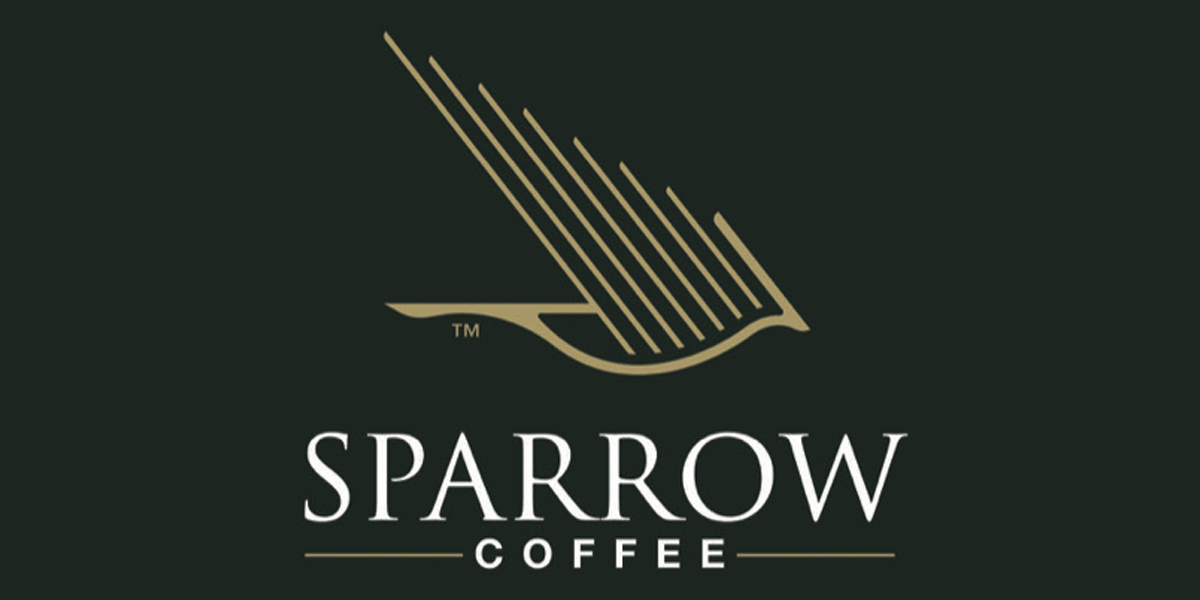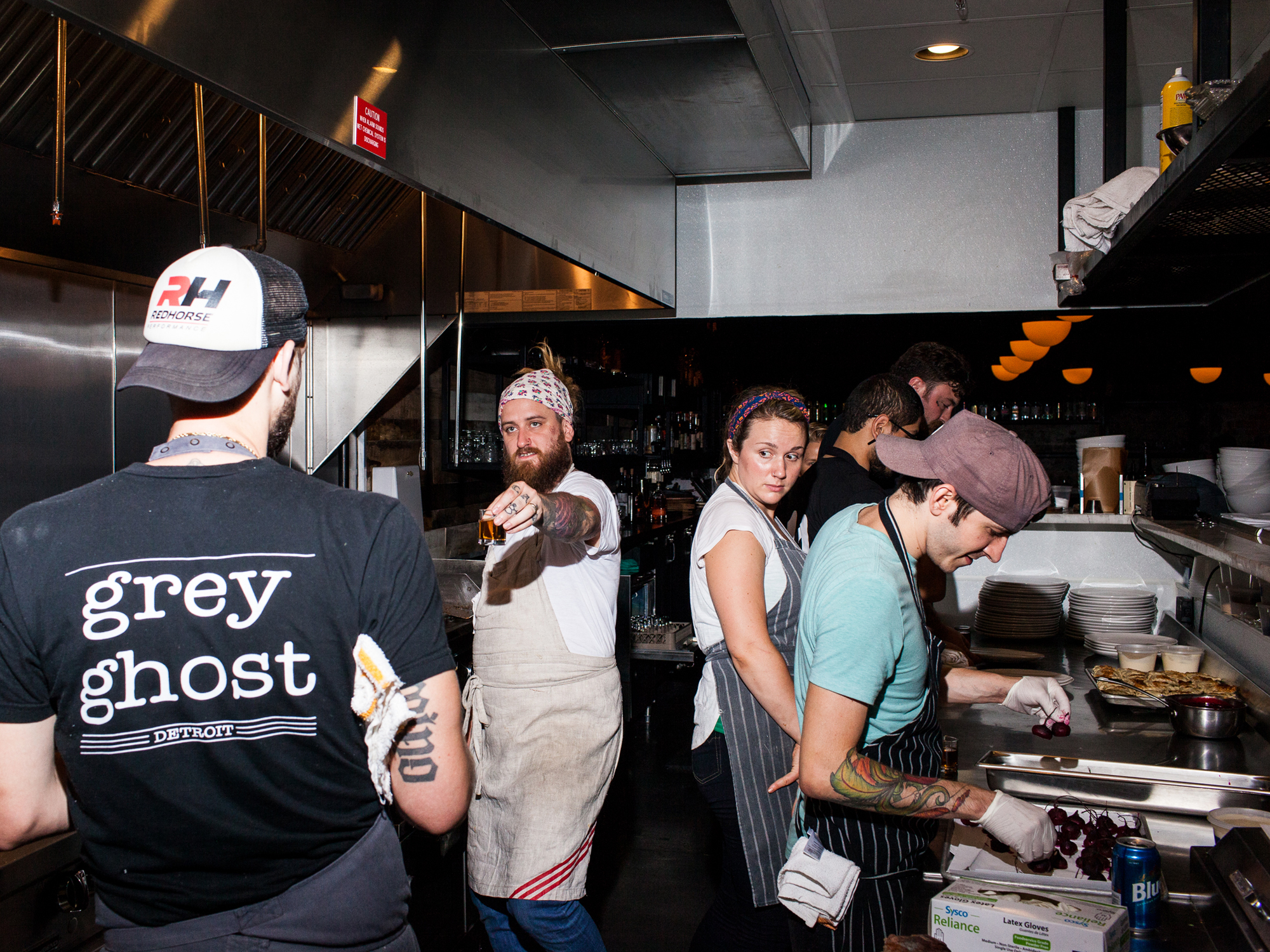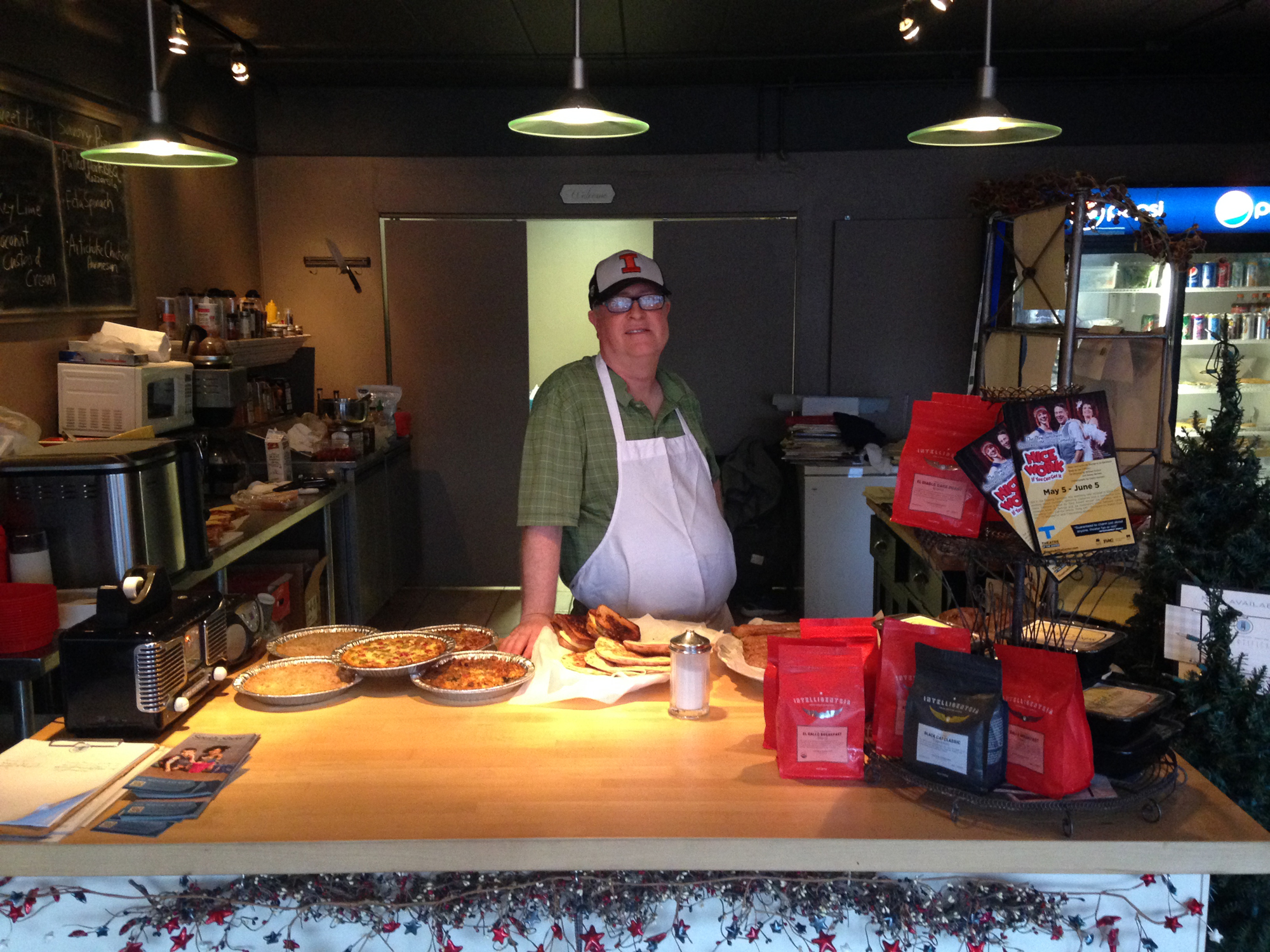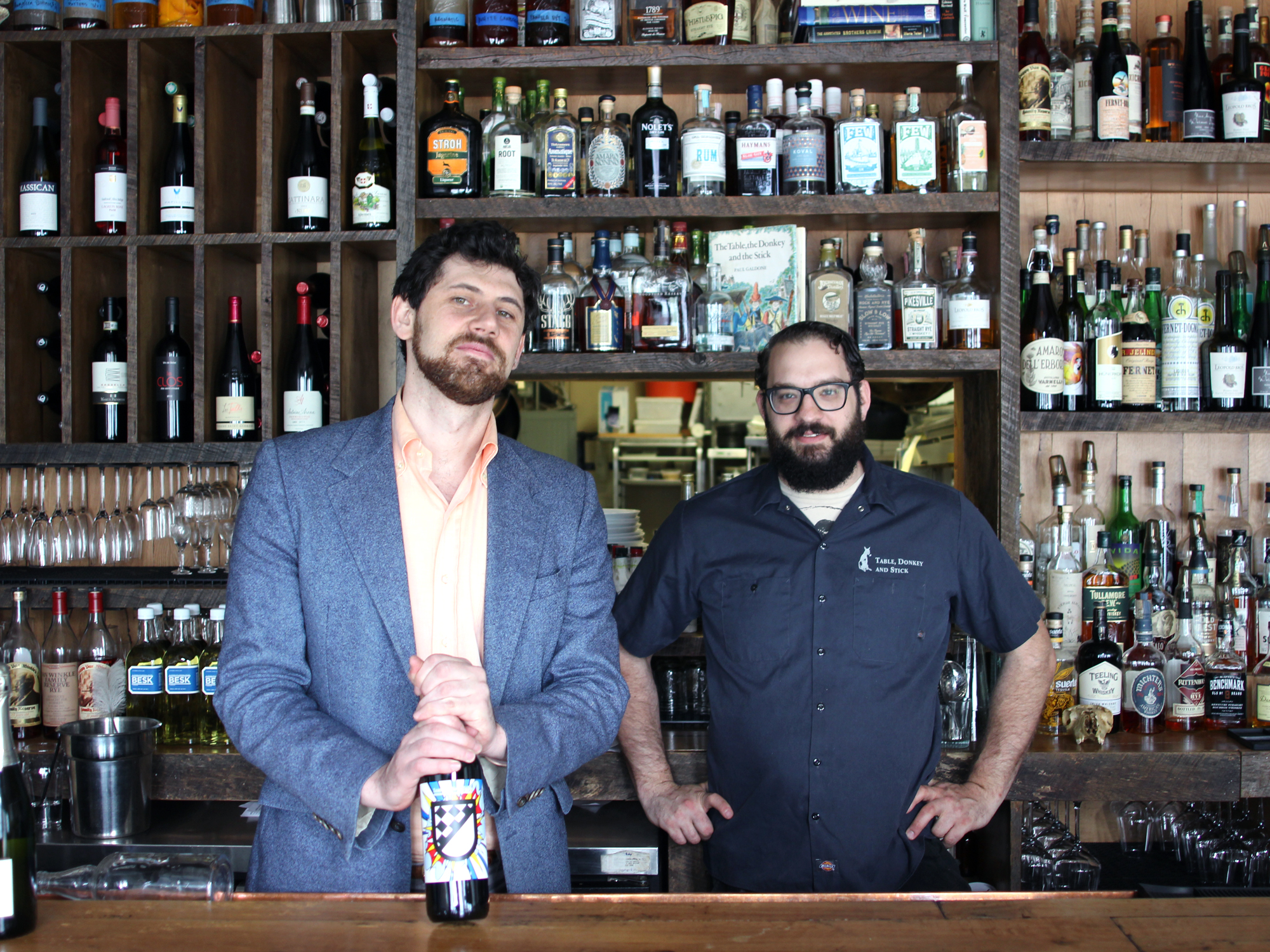THERE ARE PLACES THAT HAVE OPENED this year that I knew I admired but wanted time to think about. And then there’s Animale, which was pretty much love at first sight—because what’s not to love? Pastas and funky meats, sheer deliciousness, at very affordable prices and in a casual atmosphere that makes it an easy stop in and out for me with my kids. Even a little grumbling about slightly confused service patterns (which they’ve revised a couple of times) was just on the order of, why aren’t you my perfect restaurant already, when you’re this close? To me it’s exactly what our city has come to do so well in the last few years—casual food, of depth and authenticity, that doesn’t require a commitment of an entire evening (and a large chunk of one’s paycheck) to delight you and take you inside another culture.
Behind Animale and its parent restaurant, Osteria Langhe, is a seemingly unlikely pairing. Aldo Zaninotto was well known around town as a wine importer before he decided to open Osteria Langhe in Logan Square, devoted to the food and wine of Italy’s mountainous Piedmont region. (The Langhe is the part of Piedmont where, among other things, white Alba truffles come from.)
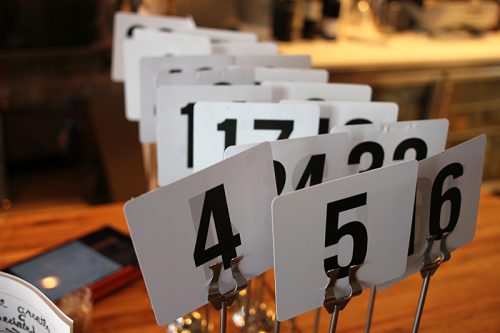
Cameron Grant, the chef, was born in Scotland and grew up around food—his mother had a catering business and a considerable vegetable garden, while his father “went pheasant and grouse hunting, and came back with food that they would call chicken, which clearly wasn’t chicken,” he says. At age 12 he moved with his family to Colorado, and after culinary school he worked for an Italian family in Boulder. When he asked them if they had a connection where he could do an internship in Italy, they sent him to the Langhe—and he found the cuisine he wanted to cook for his career.
Cameron was working for a hotel in the suburbs when he met Aldo at a wine dinner, and Aldo realized that he’d found the chef for his idea of a Piedmontese restaurant, Osteria Langhe. Which in turn would lead to Animale, their second restaurant, which is very much informed by how what they wanted from a restaurant changed after they opened their first one. I asked them to tell me how it all began, even before Osteria Langhe. Here, in six chapters, is their story.
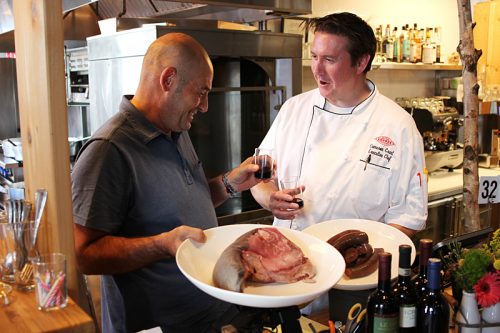
Co-owners Aldo Zaninotto and chef Cameron Grant, with beef tongue and blood sausage
1. Cameron arrives in the Langhe, unannounced
CAMERON: No one picked me up at the airport. I had to find a bus to the train station, I took three trains, no one speaking English, arriving in Alba and walking into a hotel thinking, a hotel, someone speaks English. I was like, do you know of this restaurant, Tornavento? They said, Oh yes, we do. I said, Is it good? They’re like, It’s the best. So I said, can I get a taxi? I didn’t even know if I was living there, no one had told me anything—it was just, get on a plane and figure out what the hell’s going to happen to you.
So I showed up and they said, oh, you’re actually going to sleep here, upstairs, and [chef] Maurilio [Garola] will be here in a few hours. They said, do you want to watch and see what’s going on with the restaurant? So I hung out for the night. Finally they said, you must be tired, so I went upstairs and went to bed.
And then I woke up, and the restaurant was closed the next day, so no one was there. The entire restaurant was locked and empty. I’m asleep in this empty restaurant that I’ve never been to before. And I was like, are you kidding me? Okay, I knew where Alba was, because I was in the cab ride, and it was like seven kilometers. So I was just like, okay, I’ll just walk to Alba and figure out something to eat and drink.
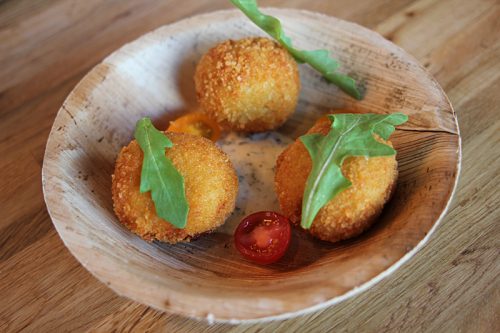
Arancini
So I walked, and then I ate, and I drank, and I walked around, no one spoke English and I spoke Spanish, so it started. At least I knew where I was going back to, so I took a taxi, I couldn’t even call somebody there to ask them to pick me up. So then I came back, and they’re like, oh, where’d you go? I told them and they’re like, you’re crazy. Well, what did you want me to do, sit here and raid your cellar?
I went there for three months, and by the end I was begging to kiss the ground of the United States and get out of there. Because it was like 110 hours a week, for free. But even so, I had the most amazing summer of my life. I lived with the sommelier of the restaurant, in that room, and we would go out after service and then everyone would buy pizzas, and all the tips would go to pizzas for the staff.
And we would go the mountains on our days off, where the [2006 Torino] Olympics were, and eat at these amazing restaurants, and drink 22 bottles of wine, and have 12 course lunches and start over for dinner again. Just the culture while I was there was life-changing, and I came back and thought, this is different now, I’ve got to figure out who I’m going to work for that’s going to appreciate what I’ve learned.
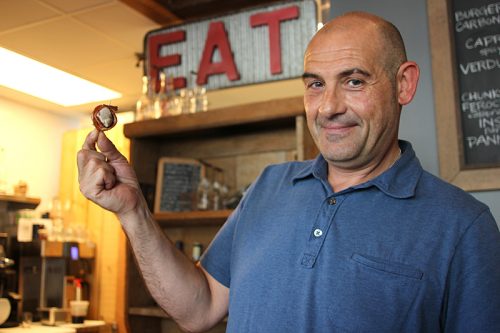
Bacon-wrapped sweatbread, ready to be battered and fried
2. Aldo finds a Piedmont village in Logan Square
ALDO: For me, being in the wine business, and seeing the wineries, and then becoming an ambassador for the wineries, I felt like a lot of people didn’t really know what it meant—what is being “regional” to them? They see Italy as the big bowl of pasta, but it’s way more than that. Our culture’s so diverse, from north to south, east to west, from the center to the mountains. You see places that are Sicilian, Sardinian inspired, Tuscan, but we never hear about the Piemonte thing. And going around the country, seeing that people don’t know so much about it, I thought, it’d be really cool to bring something different to Chicago.
We do have the people who say, “What kind of Italian restaurant is this, you don’t have any chianti, no Montepulciano, no Brunello”—we make a joke about it, “Oh yeah, I forgot to get some at the store.”
So when we first met through the winemaker Giorgio Rivetti of La Spinetta, I threw it out to Cameron and I said, we’re going to do something really cool. We’re going to be focused on the region, just the way you did when you were working over there. We’re also going to be in a specific neighborhood, just the way it would be when he was living over there. In Treiso, in Barbaresco, he had this community around him and this is who he catered to. And on the weekend he had the tourists, of course.
I said, we can apply the same thing. We can be at the center, having the people come to us and we cater to them. The perfect location for me, I thought, because of the diversity of the people and this area was Logan Square. When you look at the diversity of restaurants we have, Table, Donkey & Stick, Fat Rice, Longman and Eagle, Scofflaw—it was like, wow, we can really be adventurous here. I knew exactly where I wanted to do it, and from there, we just did it.
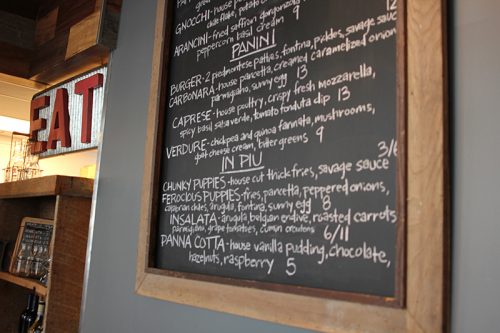
3. Opening a regional restaurant is a learning experience
ALDO: First of all, we had a really set mind, how we’re going to work this out. With Cameron it was about, just do what you did in Piemonte, what you did in Italy. Bring back what the culture is. With wine, I’m going to make it exciting, I’m going to make it interesting, do great training with my staff. And it was hell at the beginning, we’re like, what are we doing here.
When we first put the sign out, nobody knew what “Osteria Langhe” meant. People would walk by and then write something on a neighborhood website, “Oh, another Italian spot that’s going to fail,” so it was not very encouraging. But who cares. We know who we are, he’s dedicated in the kitchen, I’m going to be in the front, and I had a great following with friends in the industry, they would trust me to do this. But the beginning was a learning experience.
Now that we’re in two and a half years, we’re still a learning experience but we’re more in the driver’s seat. We do have the people who say, “What kind of Italian restaurant is this, you don’t have any chianti, no Montepulciano, no Brunello”—we make a joke about it, “Oh yeah, I forgot to get some at the store. We ran out of tomato sauce,” just to keep it fun. But you know, they discover it—and that was the whole purpose, trying to bring this culture to Chicago and make it exciting. And we did all these events, grilling night and Beef Wellington and so on, to try to get people to say, not just, it’s another Italian restaurant, but this is your local, neighborhood place.
And plin [a signature dish, similar to ravioli] became this other dimension of craziness for us. Today, there’s not one table that doesn’t order plin. So this is beautiful to see, more and more people bring their friends. And we can slow down a little bit and enjoy it more. I have people who come in, if they want to bring their own special wine from Piemonte, bring it over and I’ll drink with you.
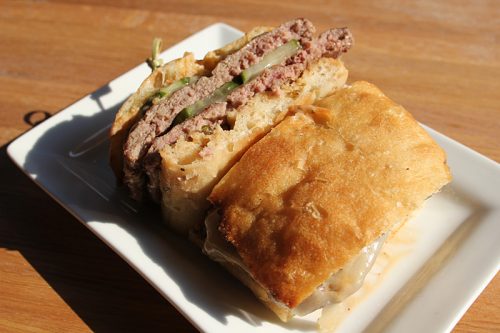
Animale burger
4. Wanting a different life with Animale
CAMERON: Osteria Langhe, I lived there in the beginning, Aldo is still always there. I have a family, I want to be able to spend time with them.
For a second concept, we talked about all sorts of things, like puff rolls and burgers—something that really draws attention. We weren’t going to live at the second one, but putting your heart and soul into a business doesn’t mean you have to live there and make your family suffer. You can run it like a business and make it work.
So we thought, okay, we’re known for Italian food, why don’t we run like a spinoff of that in a fast casual format, and see what we can do with a burger and off cuts. Because I love off cuts at a place like Fergus Henderson’s St. John in London—I just went there a couple of weeks ago. And I’d seen the restaurant in the press for years, Bourdain went there, Gordon Ramsay went there. Henderson has Parkinson’s, but he’s still making a stand. And I think you have to stand for something in this business to stand out. Because if you don’t make a stand, you’re a hodgepodge.
Which can work, if you have the right location. But we don’t have a ton of money, so we had to choose something that we believed in and find a location that we thought worked really well, and then move forward with, how do we do Italian quickly? So we wanted the off cuts because it would stand out. We wanted to do the paninis, because then it’s between bread and we’re all set. And then, why don’t we throw in pasta, because it rounds it out and makes the menu really tight.
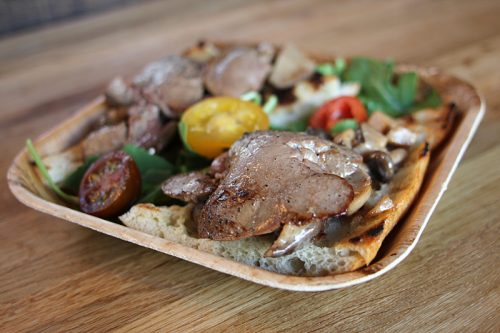
Rabbit livers on toast
5. Making it for the neighborhood
ALDO: Our baby is Osteria Langhe. Not to say Animale is not important, but they’re run in a different way. For the wine, the idea was to create a program where, if people are going to focus on the food, why not give them something where they don’t have to think too much about it. So we’re going to do three whites, and three reds. A light white, a medium white, or a full white. And those wines will be changing constantly. So that people can discover things all the time.
On the service aspect, it’s the same thing—where do we go with this? We don’t want people to think that there’s going to be service like Osteria Langhe, because then the check’s going to go higher. We just want to make them comfortable. And the first few days we were open, we found something that we hadn’t thought about—the strollers were coming with kids. And we were not prepared for that. We didn’t have a kids’ menu. But that was exactly what we were supposed to be—a neighborhood restaurant where people could be casual, kids, no kids, they can run around, whatever.
But we wanted people to have a great experience. The setup, the counter, the waitstand, the booths, the big table, the TV on the wall—it was all the purpose of saying, this is really about this, it’s not about that [waving in the general direction of Osteria Langhe]. We did our research and the more we talked about it, the more we thought, keep it simple, keep it fun. Our generation, the people that are around now are really foodies—but if you go to places like Antique Taco or Furious Spoon, it’s not fancy, you just go, here’s your number, you sit down. Italian street food does not exist in this country, unless you only do porchetta, so coming from an upscale place, we wanted to keep it casual, make it unassuming. Make it fun.
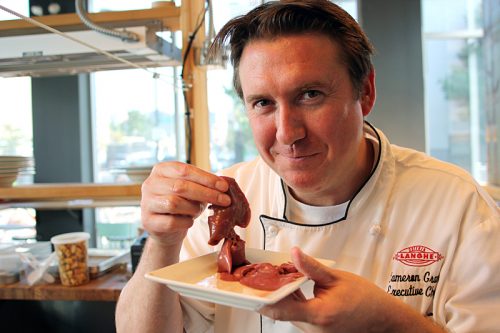
Feeling a bit peckish—rabbit livers
6. Why they thought people would order the off cuts
CAMERON: We’ve run a lot of things at Osteria Langhe and people have loved them, like the finanziera, which is a classic Piemontese stew, with like a chicken’s crest, spinal column, testicles and sweet breads and brain, and then it’s mixed with filet and little meatballs, marsala, peas, mushroom, you could add artichokes… I think Chicago’s such a foodie city, just the interest and excitement about food is so great and people are willing to take the risk.
And we had the name—when we opened Osteria Langhe, nobody knew us, well, they knew Aldo but not for a restaurant. But nobody knew me, and we had to build a reputation with every meal. Opening this seemed easy by comparison—if we had a good location and we made really good food that made people happy, why would they not come back? Especially if it was cheap.
I wanted to take really interesting cuts—we call them the deep cuts—and prepare them in a way that someone who was not comfortable with them would find made them more comfortable. So wrapping things in bacon and beer battering them made sense. Doing like a spicy green chile with tripe and housemade pancetta, with an egg and a garbanzo bean pancake—that made sense. Having puttanesca, which is such a classic but not a lot of people do, because it’s from the Amalfi coast—but doing that with wagyu tongue, and crispy bread, just made sense in my head. It’s all about things that I thought could make things approachable to people who came in here, and the off cuts, they aren’t too expensive, so we could offer a pretty good price, and maybe two or four people share a dish, and take a risk—and maybe they fall in love with it.
We’re just giving them something different, and doing it really well, and putting our heart and soul into it—which Aldo and I always do.
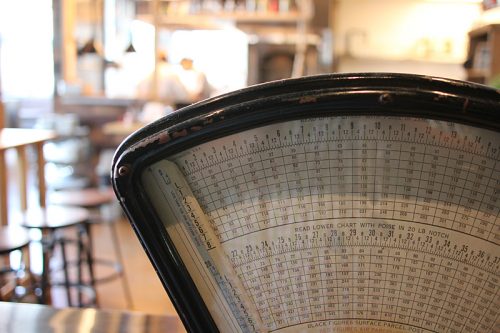
Michael Gebert is un animale of editing at Fooditor.
Latest
Join the Discussion
After you comment, click Post. If you're not already logged in you will be asked to log in or register with Disqus.




